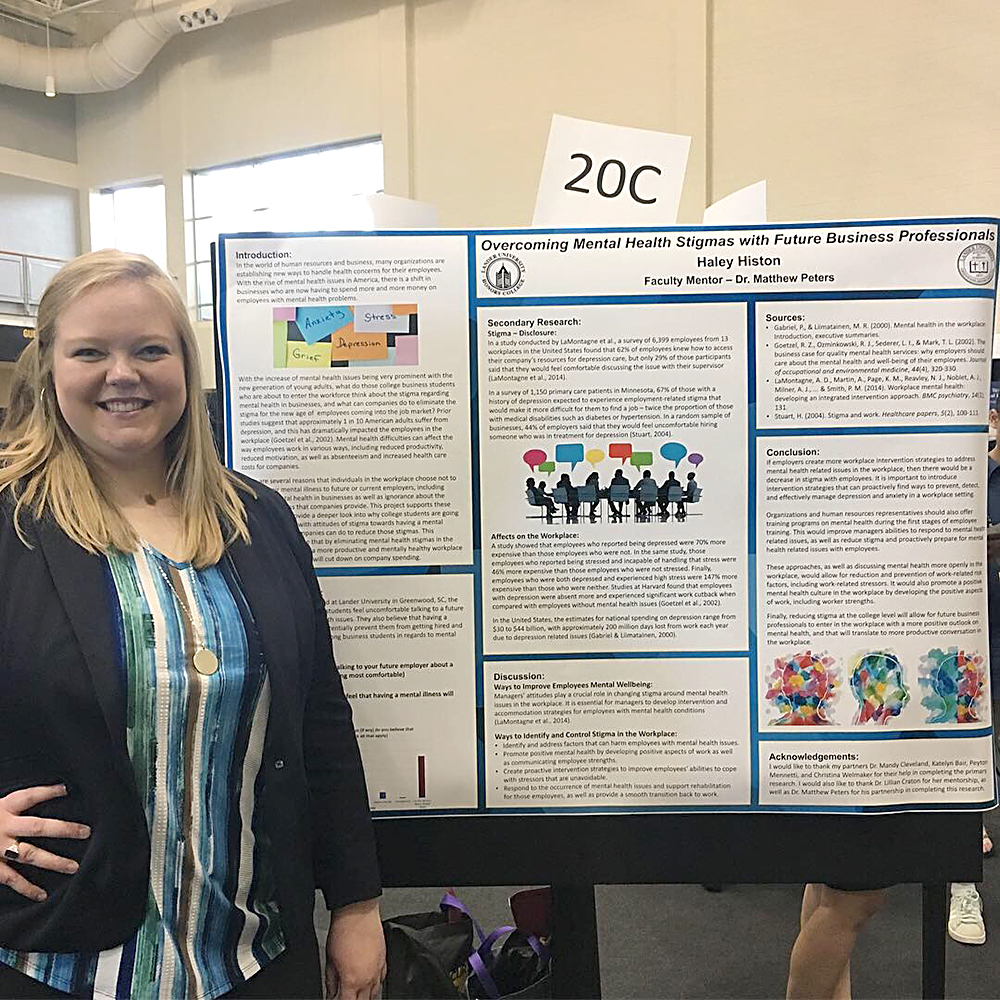
In mid-April, a group of Lander University students presented findings from their undergraduate research projects at the 2019 National Conference on Undergraduate Research (NCUR).
The conference, the largest of its kind for undergraduate research in the world, was held on the campus of Kennesaw State University in Marietta, Ga. Each year, the conference attracts an estimated 4,000 student researchers from colleges and universities throughout the U.S.
Perrin Rickenbaker, of Greenwood; Amber Christine Lee, of Greenwood; Autumn Wofford, of Leesville; and Skyler Aldrich, of Conway, collaborated to examine the differences in how people react to traumatic events in their lives.
"A key set of factors in understanding individual differences in trauma response is how people think about themselves and the world in relation to the stressful event," the group wrote.
Through self-report surveys, the group looked at a host of factors, including:
Hannah Joan Leister, of Greenwood, studied the ability of businesses to effectively market services deemed "intensely personal." For her project, Leister focused on tattoos, "one of the most personal forms of consumption available," she wrote.
Leister talked with a focus group of Lander students about young adult tattoo purchases, and found that tattoos often become part of the person's extended selves, "when the product serves as physical embodiment of a past experience or memory, and invites feedback from others," she wrote.
From her research, Leister concluded that by better understanding the motivation behind (purchasing) decisions, businesses can enhance their marketing of similar personal products.
Mekensie Nichole Therrien, of Gray Court, focused on the impact among university students of common stigmas associated with mental illness, counseling services and medication.
"Because stigmas often create barriers for those in need of care, the primary purpose of this research was to discover relationships between stigmas, students' likelihood to seek help and overall self-approval among students affected by mental illness," Therrien wrote.
Jacob Bryant, of Starr, compared the progress of two energy providers (Scottish Sothern Energy in the UK, and Duke Energy in the Southeastern U.S.) as they pursue renewable energy sources.
While both companies have made strides in their efforts, Bryant's research lead him to conclude that Scottish Southern Energy have made more concrete progress in their renewable energy efforts.
"With 54 renewable energy plants and a customer base almost double that of Scottish Southern, Duke Energy only produces a mere 2900 megawatts of renewable energy," Bryant wrote. "Scottish Southern produces a total of 3,308 megawatts in a country with a limited amount of land available in large energy farms."
Ivey Gibbs, of Charleston, examined the anti-war effort of South Carolina newspapers in relation to the initiation of the military draft during World War 1.
"Anti-war newspapers framed their arguments in context of the South's political climate, with issues of racial and economic inequality overshadowing the national debate about isolation and intervention," Gibbs wrote.
In reaching her conclusion, Gibbs analyzed archived issues of The Charleston American, The Anderson Farmer's Tribune and The Abbeville Scimitar.
Haley Histon, of Greenville, examined new ways some businesses and organizations are addressing health concerns of their employees. Histon specifically looked at how university business students on the verge of entering the job market feel about talking with their future employer about mental health issues.
Utilizing a survey of Lander business majors, Histon documented the feeling among many who felt having a mental health issue could negatively impact their ability to be hired by an employer.